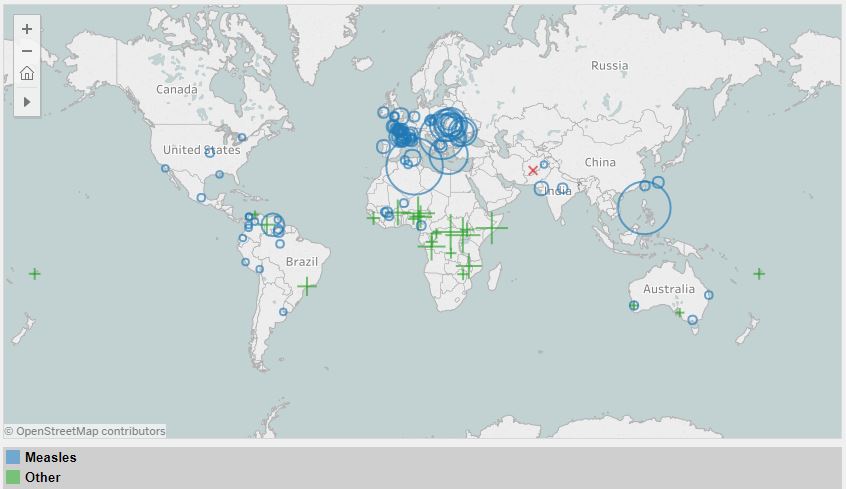The measles epidemic sweeping Europe has reached an eight-year high, with more than 41,000 cases reported in the first six months of 2018, the World Health Organisation (WHO) has warned.
The figures are almost twice the annual number of cases recorded in 2017, which had – until now – been the worst year in a decade with some 24,000 people contracting the infection.
The outbreak and spread of the contagious disease is high especially when one notes the figures for 2016, where there were only 5,273 cases registered in all of the EU.
According to the European Centre for Disease Control, Malta was the only EU state not to report any cases of measles between July 2017 and June 2018.
In August, The Times of Malta reported that, this year, five imported cases of measles have been reported to the Infectious Disease Prevention and Control Unit, the Superintendent of Public Health Charmaine Gauci said in a letter sent to all doctors.
Monthly country reports also indicate that at least 37 people have died due to measles so far this year, the WHO said.

Source: Global Alliance for Vaccines and Immunization (GAVI)
Measles is a highly contagious viral illness that causes high fever, coughing, a runny nose, sore red eyes and a blotchy red rash.
The disease spreads to other people through coughing, sneezing or breathing in the air where an infected person coughed and sneezed for up to two hours afterwards. It is highly contagious and if someone contracts it, 90% of people close to that person who are not immune will catch the disease.
However, vaccination rates, in particular the MMR vaccine, have plummeted in Europe as the anti-vaccine movement has cast doubts on the safety and usefulness of vaccinations.
Yet, large number of research studies have been conducted to assess the safety of the MMR vaccine, and none of them has found a link between the vaccine and autism.
Mark Muscat from WHO’s Vaccine-preventable Diseases and Immunization programme said that a significant number of reported cases in Europe are down to holiday makers bringing the disease back from countries with measles outbreaks.
“Following the decade’s lowest number of cases in 2016, we are seeing a dramatic increase in infections and extended outbreaks,” Zsuzsanna Jakab, WHO Regional Director for Europe, said. “We call on all countries to immediately implement broad, context-appropriate measures to stop further spread of this disease. Good health for all starts with immunization, and as long as this disease is not eliminated we are failing to live up to our Sustainable Development Goal commitments.”

Source: Global Alliance for Vaccines and Immunization (GAVI)
France, Georgia, Greece, Italy, Russia, Serbia and Ukraine have seen over 1,000 infections in children and adults this year. Ukraine has been the hardest hit, with over 23,000 people affected, accounting for over half of the total of 2018. Measles-related deaths have been reported in all of these countries, with Serbia reporting the highest number of 14.
According to the latest figures by the European Regional Verification Commission for Measles and Rubella Elimination (RVC for 2017, 43 of the region’s 53 members managed to interrupt the endemic spread of measles and 42 have interrupted rubella.
At the same time, the commission expressed concern about inadequate disease surveillance and low immunization coverage in some countries.
In a tweet today, the European Commission highlighted the importance of vaccines, which saves between one and three million lives around the world.
Aside from the low immunisation coverage for measles, mumps and rubella in certain countries, the outbreak also seems to have been affected by an anti-vaccine movement that insists on making a link between the vaccine and autism.
This came about after, in 1998, a British doctor Andrew Wakefield recommended further investigation of a possible relationship between bowel disease, autism, and the MMR vaccine and he continued to claim that the vaccine was not properly tested. These claims were then published in the media and also in critically acclaimed medical journal, The Lancet. However, in 2004, the journal said it should not have published the paper and, in 2010, formally retracted the paper after the British General Medical Council ruled against Wakefield in several areas. Wakefield was also struck off the medical register in Great Britain and banned from practising medicine.
The General Medical Council, an independent regulator for doctors in the UK, found that Wakefield had a “fatal conflict of interest” after he had been paid by a law board to find out if there was evidence to support a litigation case by parents who believed that the vaccine had harmed their children. In January 2011, the British Medical Journal published a series of reports by journalist Brian Deer outlining evidence that Wakefield had committed scientific fraud by falsifying data and also that Wakefield hoped to financially profit from his investigations in several ways.
Wakefield’s claims were picked up by former Playboy bunny and actress Jenny McCarthy who started speaking out against vaccines in 2007, as she believed they caused her son’s autism and claimed that he was cured with alternative treatment.
According to the WHO, the measles virus is exceptionally contagious and spreads easily. To prevent outbreaks, at least 95% immunization coverage with two doses of vaccine is needed every year in every community, as well as efforts to reach children, adolescents and adults who missed routine vaccination in the past.












